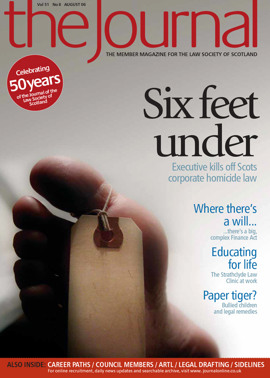Don't leave gaps in regulation

In recent months the ongoing controversy of the review of regulation of the legal profession in Scotland has taken up considerable space not only in this publication but also in the media in general.
In every article which has been printed, the need for regulation of solicitors is taken as being fundamental to the service they provide to their clients, the general public. A recent article stated that in relation to legal services provided by non-lawyers (claims handling, will writing and executry business) the public does not have these protections.
However, there are other fee-earning “non-lawyers” working today in increasing numbers in the legal profession in Scotland, the majority of whom are employed by solicitors and, it is assumed, work under their supervision, namely paralegals. Although it is generally understood that paralegals work under supervision of a solicitor, there is no statutory requirement for them to do so nor, in fact, any regulation which states that they must do so. Paralegals in private practice are fee earners and in some cases contribute considerably to the fees generated by the practice. They have daily contact with clients at every level, and particularly in firms outwith the major cities play a large part in the constant drive to give a high standard of customer service to clients in order to retain their business.
In-house legal teams ranging from local authorities, insurance companies, the courts and commercial businesses also employ paralegals. Although not performing in a fee-earning role, they often hold positions of considerable responsibility and contribute to the success of their own legal team.
At the request of the Scottish Paralegal Association (recognised by the Law Society of Scotland as the professional body representing Scottish paralegals), a joint working party has been set up with the Society to carry out research on the role of paralegals in Scotland today, including current training, with a view to recommending how this should move forward.
Taking all of the above into account, it is a continuing mystery to me why the legal profession in Scotland has displayed very little interest in ensuring that some form of regulation of paralegals is discussed and put into effect. Is it apathy, a matter that has not been considered as part of the risk management strategy, or has it been considered and rejected? It is vital to be fully aware that solicitors remain ultimately responsible for work carried out by the paralegals they employ.
At the annual conference of the Scottish Paralegal Association held in Glasgow this year, those paralegals present, who were attending from as far north as Aberdeen and Inverness and as far south as Dumfries and the Borders, voted unanimously for paralegals to be registered as members of their professional association (the Scottish Paralegal Association) before they could be employed as paralegals, and regulations put in place to govern those working in this field. This would be the equivalent of solicitors registering with the Law Society of Scotland and being governed by its regulations before they could practise law.
At this time, only paralegals who are voluntary members of the Scottish Paralegal Association are subject to some form of registration and regulation as they are registered and graded according to qualifications and experience. This grading is currently under review as part of the ongoing work of the joint working party of the SPA and the Society, with the intention that it will be replaced by grading which is competency based but which will continue to be signed off by the paralegal’s current employer on a yearly basis.
Those paralegals who are not current SPA members are not graded and therefore are unable to provide evidence of their competency levels. Recent discussions with HR directors working in the legal profession, recruitment agencies specialising in the legal field and with managing partners of legal firms have all confirmed their ongoing concerns at the quality and competency of paralegals currently in the job market – all the more reason to register and regulate the profession.
The joint working party will shortly commence an exercise to gather information from solicitors on their views on paralegals and whether they consider registration and regulation are required. If you are approached to take part in this exercise, please bear in mind the comments made above and the recent debate with the Scottish Executive, and hopefully give your support to the view of the SPA that it is time to register and regulate paralegals and bring them into line with their other fee-earning colleagues in the legal profession, both for their sake and yours.
In this issue
- Ireland 4, Italy 0
- A lack of trust
- Technology and the Scottish courts
- For supplement read tax - an update
- Eyes on the ball
- Don't leave gaps in regulation
- Keeping company
- Fighting the bullies
- The university of life
- A lack of trust (1)
- With these few words...
- Tell it like it is
- All that sparkles ain't gold
- PDF is the standard
- The paper monster
- Safeguarding fair trial
- New law, new problems
- Raising the stakes
- Mark the pre-proof
- Scottish Solicitors Discipline Tribunal
- Website reviews
- Book reviews
- It takes two to tango
- Land attachment and suspensive missives
- PSG's suite moves






